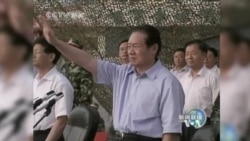The public in China is welcoming the Communist Party's decision to investigate one of the country's once most powerful politicians, former domestic security chief Zhou Yongkang. Analysts say the move by President Xi Jinping is not only an effort to win more support for the party, but an essential step to furthering much needed economic reforms and removing those who would stand in the way of change.
Zhou Yongkang's investigation is dominating headlines and discussion in China. And although there is anticipation it is all leading to a corruption trial, there is also concern that Zhou could receive lighter treatment, given his previous power and influence.
Chinese economist Hu Xingdou says while nothing is certain, he believes China's President Xi Jinping has already shown his unwillingness to compromise.
"Zhou's investigation is part political struggle, but it is unlikely to be used as just a showcase for the anti-corruption drive. I would expect the anti-corruption drive will continue and even higher ranking officials could be next," he said.
Hu believes Zhou eventually will face charges in court, but Chinese historian Zhang Lifan is less certain.
"There are several dilemmas [the leaders are faced with] regarding Zhou Yongkang's case, such as whether Zhou Yongkang will cooperate with the investigation, whether [the authorities] will use his case to ferret out more 'tigers' [high-ranking officials], whether his case will become a political one, whether an anti-party clique might become involved, or whether the case will simply be dealt with as a regular corruption case. It is still hard to tell for the time being," said Zhang.
Bo ally
Zhou was a close ally of former rising political star Bo Xilai, who was sentenced to life in prison last year. Several of Zhou’s former associates already have been fired and some now are facing criminal investigations.
Once a member of China's top political body, the Politburo Standing Committee, the decision to move forward with Zhou's investigation is highly symbolic.
It is also crucial, analysts say, because as China's economy continues to slow, cleaning up rampant corruption is seen as good for the Communist Party and good for business.
Political scientist David Zweig said, "There is too much unbridled uncontrolled power [in China) and he [Zhou] is the classic example of a guy who could misuse that [power]. I think its a good lesson, might be surprising somewhat to the people in China, but it will drive home very much to them that there needs to be constraints of the use and abuse of power in the Chinese political system."
How soon Zhou could face charges is unclear. What is most likely is that he will first be expelled from the party, analysts say, and then face criminal charges -- an effort that could take months, if not longer.





